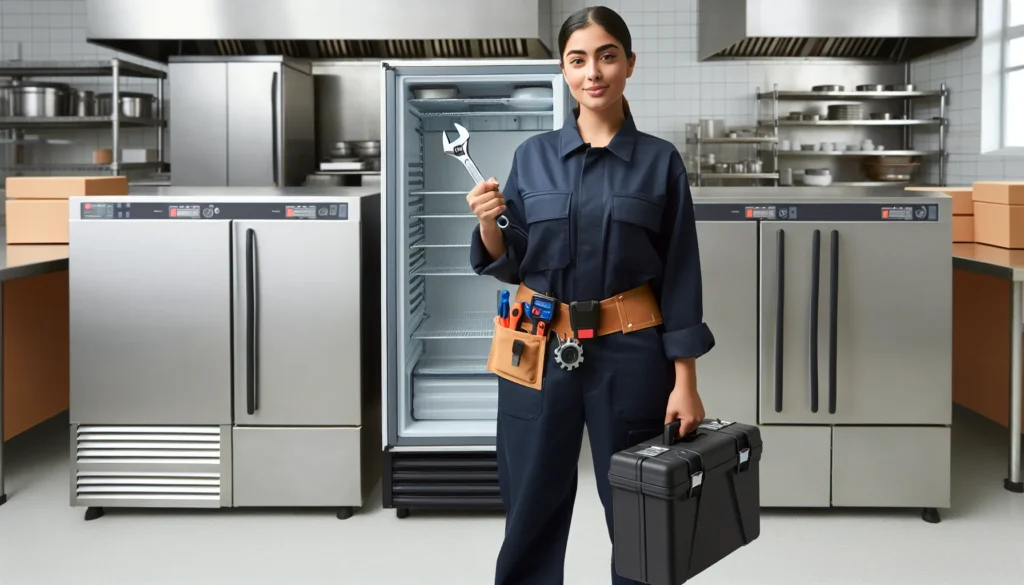Commercial refrigerators are essential for businesses in the food and beverage industry. Ensuring your refrigerator operates efficiently is critical for maintaining food safety and reducing operational costs. Neglecting proper maintenance can lead to costly repairs, spoiled inventory, or even health code violations. Here are the 10 signs that your commercial refrigerator needs immediate maintenance to keep your business running smoothly.

1. Unusual Noises Coming from the Refrigerator
If your refrigerator is making loud, strange, or unusual noises, such as banging, hissing, or buzzing, it’s a clear sign of a problem. These sounds often indicate issues with the compressor, evaporator fan, or condenser coils. Ignoring these noises could lead to complete system failure, so it’s best to call a technician immediately.
2. Fluctuating Interior Temperatures
Consistent and proper temperatures are crucial for preserving your inventory. If you notice that the refrigerator’s interior temperature is fluctuating or failing to maintain the set temperature, this could mean malfunctioning thermostats, dirty coils, or refrigerant leaks. Regular temperature monitoring is essential to detect these issues early.
3. Water Leakage or Pooling
Water pooling around or inside the refrigerator indicates a problem with the drainage system, clogged drain lines, or a faulty door seal. Excess moisture not only compromises the refrigerator’s efficiency but also promotes mold growth and damages flooring, leading to additional expenses.
4. Frost or Ice Buildup
While frost-free systems are designed to prevent ice buildup, the presence of excessive frost indicates a problem. Common culprits include a broken defrost system, damaged door seals, or airflow blockages. Frost buildup can restrict airflow, reducing the efficiency of your refrigeration system.
5. Increased Energy Bills
If your utility bills are suddenly higher without a corresponding increase in usage, your commercial refrigerator may be working harder than it should. Faulty components such as worn-out gaskets, dirty condenser coils, or inefficient compressors could be causing energy inefficiencies. Scheduling maintenance can help identify and resolve these issues.
6. Spoiled or Compromised Food
One of the most noticeable signs of a malfunctioning refrigerator is food spoilage. If your inventory is spoiling faster than usual or not staying as fresh, this indicates a temperature regulation issue. Blocked air vents, refrigerant leaks, or failing fans could all be contributing factors.
7. Door Not Closing Properly
A door that doesn’t seal tightly or closes unevenly can allow cold air to escape and warm air to enter. This compromises temperature stability and forces the refrigerator to work harder. The problem could stem from damaged gaskets, misaligned hinges, or a warped door frame.
8. Condensation on Glass Doors or Interior Walls
Excessive condensation on glass doors or inside the refrigerator signals a problem with the unit’s cooling system. This could indicate a defective door gasket, improper humidity levels, or an overworked compressor. Persistent condensation can lead to mold growth, affecting the hygiene of your storage area.
9. Overheating Exterior Surfaces
While it’s normal for certain parts of a commercial refrigerator to feel warm, excessively hot surfaces are a red flag. This could mean the condenser coils are dirty, the fan isn’t working correctly, or the compressor is under strain. Overheating components can cause premature wear and tear, leading to costly repairs.
10. Strange Odors Emanating from the Unit
Unpleasant smells coming from your refrigerator could indicate mold growth, spoiled food, or mechanical issues. If cleaning doesn’t resolve the odor, there might be a more serious issue such as a clogged drainage line, refrigerant leaks, or malfunctioning components.
Why Regular Maintenance is Crucial
Ignoring these warning signs can lead to equipment failure, costly downtime, and health code violations. Scheduling routine maintenance helps prevent these problems, extends the lifespan of your refrigerator, and ensures your business remains compliant with safety regulations.
Steps to Take When You Notice a Problem
- Monitor and Document: Keep a log of any unusual occurrences, such as temperature fluctuations or noise levels.
- Inspect Components: Check for visible issues like damaged gaskets, frost buildup, or water leaks.
- Schedule Professional Maintenance: Contact a certified technician to address the root cause of the problem and perform necessary repairs.
- Clean Regularly: Preventive cleaning, such as wiping down seals and clearing drain lines, can reduce the likelihood of issues.
The Importance of Partnering with a Professional Service
Working with a trusted commercial refrigeration maintenance provider ensures that potential issues are identified early and resolved efficiently. Look for technicians who specialize in diagnostics, part replacement, and preventive maintenance. A well-maintained refrigerator not only saves money but also protects your business reputation.

